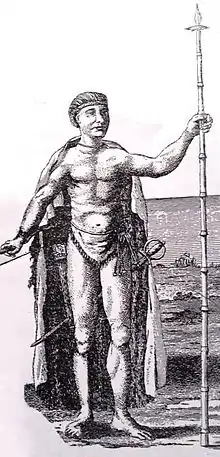Cangapol
Cangapol was a Tehuelche cacique from the area of Huilin, in the Negro River Valley in today's Argentina[1] from 1735 to 1757.[2] Born in 1670,[3] he was the chieftain of the nomadic Leuvuche people, who moved through a huge area from the Negro River to the Vulcan hills, today known as Tandilia hills, between the modern cities of Tandil and Mar del Plata.[4] The Leuvuches were in fact called Serranos (people from the hills) by the Spaniards.[2] In 1751, Cangapol and his warriors expelled the Jesuits from Laguna de los Padres and destroyed the settlement built by them five years before.[2] In 1753, he became an allied of the Spaniards against the Mapuches, who used to take profit of the Leuvuches' plunder raids north of the Salado river and then sought safe haven in Chile, leaving the Leuvuches to face the Spanish retaliation alone.[5] He died in 1757 and was succeeded by his son Nicolás.[6]

References
- Mandrini, Raúl José (2011). Sobre el Sutee entre los indígenas de las llanuras argentinas. Universidad Nacional del Centro, p. 269 (in Spanish)
- Los padres de la laguna by Carlos Rodríguez. Página 12, 22 January 2012 (in Spanish)
- Hux, Meinrado (2003). Caciques puelches, pampas y serranos (in Spanish). Elefante Blanco. p. 92.
- Descripción de Patagonia y de las partes adyacentes de la América Meridional by Thomas Falkner (in Spanish)
- Solís, Leonardo León (1991). Maloqueros y Conchavadores en Araucanía y Las Pampas, 1700 – 1800. Ediciones Universidad de La Frontera. Serie Quinto Centenario, Temuco, 1991, pp. 35-37 (in Spanish)
- Bandieri, Susana (2006). Hecho en Patagonia: la historia en perspectiva regional (in Spanish). Universidad Nacional del Comahue. p. 107. ISBN 9871154852.